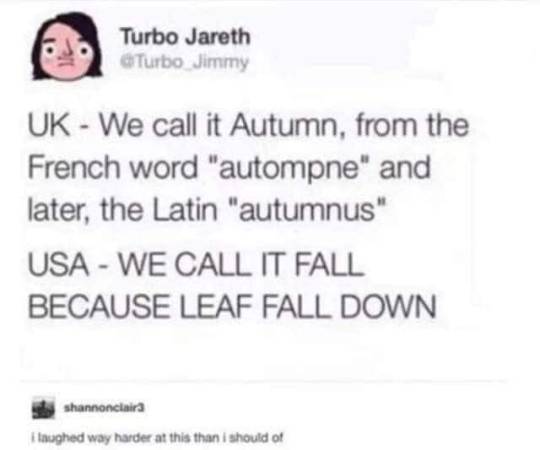#British dialect
Text
Love when British people say “about” instead of “around” like hell yeah. What’s goin about rn
8 notes
·
View notes
Text
i'm conducting an experiment. everyone who's from an english speaking country state your country, regional area and what you call the following images. i need to see something







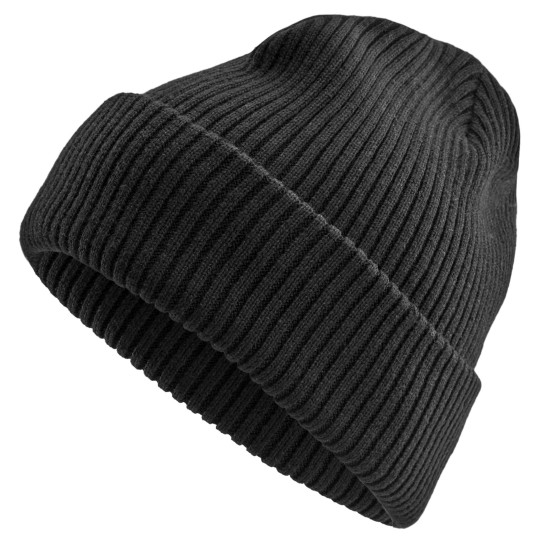

#ex: united states > south > sodapop#please rb so more people see#american english#australian english#british english#canadian english#english#english language#dialects#accents#american accent#australian accent#british accent#canadian accent#english accent#america#australia#england#canada#those four are my target audience but all answers from around the world are welcome!!#tumblr#discourse#experiment
20K notes
·
View notes
Text
Review: The Black Locomotive — Ryan Hughes
Review
Okay, first of all, the graphics are gorgeous. I’m not a fan of brutalism at all, and even I was captivated by the way this book was illustrated, and the way the prose was written. It was written in a lot of detail, so if you’re not a fan of heavy prose I would be careful, but the way Hughes describes his characters’ surroundings make even the dull, grey industrial world of London breathtakingly beautiful. The author manages to convey a deep love for modern architecture; a love I personally don’t share, but I can certainly appreciate the love that went into describing it.
If the main draw for this book for you was a love of steam trains, I hate to disappoint you, but there isn’t a great deal of steam train-action in this book. Some, but it’s not exactly the main focus. But hey, if you’re a fan of really wild and unexpected plot developments, hop on board.
I enjoyed most of the characters in this book. They may not all be likeable, necessarily, but they’re all interesting, and sometimes that’s all you need. I particularly loved Georgia Ash, a welcome subversion from the classic “female no-nonsense boss to the loveable rogue employee”; Ash actually ends up being not only an important character, but an actual character, one with her own internal world outside of the protagonist.
But unfortunately there is one major area where The Black Locomotive fails. There are 2 characters of colours in this book; one pretty unimportant, and the other a black teenager who happens to be the leader of a crime gang. I mean seriously people, it’s the 21st century, how do some authors still have so little self-awareness? It’s disappointing, as I would absolutely love to recommend this book, but I just can’t ignore the obvious racism.
Language Level
Oh, and aside from that, Jesus Christ almighty the English in this book is complicated. I had to create a whole new difficulty category on this blog for this thing! Even I was googling words several times per chapter, and I am an English student. I was able to understand the words in the context of the sentences, but trust me, unless you’re a scientist (or you’re really into rocks), you are never going to hear someone say the word “stratigraphy” in your life.
If you’re a fan of science, this book might be for you, as a majority of the words I struggled be turned out to be words relating to physics.
It also uses neo-pronouns (in this case Xi/Xe/Xer), which if you’ve not seen before I should briefly explain. Standard English has three common sets of pronouns:
He/Him/His
She/Her/Hers
They/Them/Theirs
All three can be used as singular pronouns, although “They/Them/Theirs” is more commonly used with plurals. A lot of people will tell you, mainly for political reasons, that “They/Them/Theirs” can’t be used for single people. We have, however, been using “they” for a single person since at least the 17th century. If you didn’t know the gender of a person, for example, if you saw someone leave a table and forget their head, but the gender of this person wasn’t obvious, you could simply say: “Oh, they left their hat behind. I should pick it run over so I can give it back to them.” This is completely normal English.
Neo-pronouns were created by people who don’t identify as men or women, who are called non-binary people. Non-binary people can go by any of the pronouns I listed above, but many people aren’t satisfied with these choices, and so, neo-pronouns were created. Neo-pronouns are still very new and a lot of people will tell you they aren’t correct English, but you know what? Language evolves. People make up new words all the time, that’s how words are made up. But people who use neo-pronouns are very rare, and most people who are non-binary will ask you to call them he, or she, or they. Please be respectful and remember to call them by the pronouns they have chosen, even if it’s a bit confusing at first!
0 notes
Text
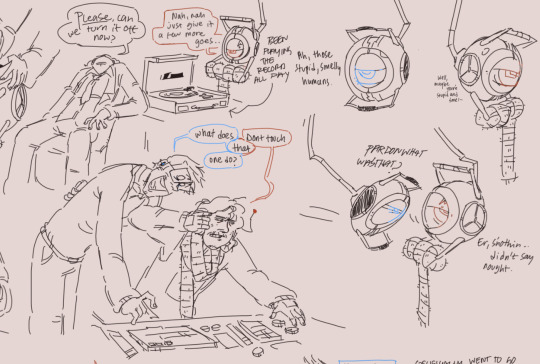
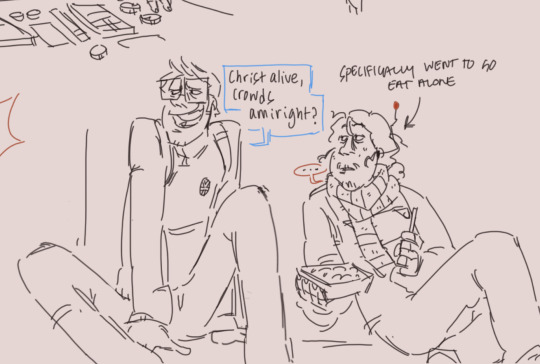
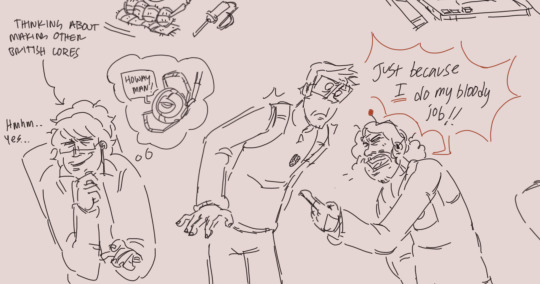
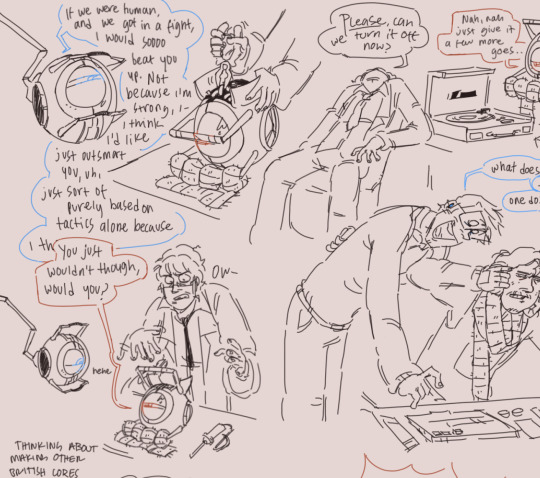
silly little guys doing silly little things..
#some oc and Wheatley interaction#I love my little oc core I just don’t know what to call him#me not beinig able to choose a consistent design for human Wheatley#also the thought of just making as many cores with as many different British dialects as I can is so funny#their relationship is not based on the xfm arguments Karl and Steve get into noooo not at all what are you talking about#portal 2#portal fanart#wheatley portal 2#core oc#portal 2 fanart#Wheatley#oc#thatsonehellofanart#human wheatley
54 notes
·
View notes
Text
I like to imagine that the fed workers on quesadilla island have their own dialect of sign language that they created themselves over time. Cuz sign language is so different and is as varied as spoken language is and I think it would be really cool if there was like. Quesadilla Sign Language. or something
#txt#qsmp#qsmp headcanons#i think the eggs also pick it up but also know the sign versions of their native language(s)#also dialect isnt the word i was looking for here but idk how else to describe there being multiple sign languages that are all different#like how english has different dialects but sign language is a whole different language between those#like american and british english have dialect differences. but ASL and BSL are just completely separate
39 notes
·
View notes
Text

British English Dialects
20 notes
·
View notes
Text
I have just started learning Portuguese, and I am fascinated by the pronunciation of European Portuguese compared to Quebecois French: we both completely omit a significant proportion of the vowels in our words in basically the same way. But whereas the attitude in Quebec seems to be that this is wrong or bad somehow, when learning European Portuguese it is considered the correct pronunciation. So the immediate conclusion I would draw is that there is still a strong "metropole = correct" bias.
But: Nobody ever seems to imply that the Brazilian pronunciation, where all the vowels are actually pronounced, is inferior. In fact, when trying to learn Portuguese as a second language, Brazilian Portuguese seems to be the standard.
To me, arguing that Quebec French is somehow inferior or less correct than France French has always seemed absurd, like arguing that Canadian or American English are somehow less correct than British English.*
And yet I know that a lot of people think that any English that isn't RP is inferior or incorrect, and that speaking RP means that you "don't have an accent". 🙄
I haven't studied Spanish, so I don't know what the attitudes are towards the respective dialects there.
I imagine this has all been researched and I am curious to learn more. I feel like in my limited experience, on a scale of how much the metropolitan dialect is valued over the colonial dialect, French is the highest and Portuguese is the lowest, with English somewhere in between, but I could be completely off base. I wonder what the factors are that affect these attitudes.
*I should disclose my personal bias that I vastly prefer Quebecois French: It's pithy! It's evocative! It goes straight for the gut.
#lingblr#dialects#linguistics#metropolitan dialect#colonial dialect#language#European Portuguese#Brazilian Portuguese#Quebecois French#France French#British English#American English#Canadian English
42 notes
·
View notes
Text
writing fanfic is near impossible. do you guys really say things like “cheeky sod”
#that doesn’t sound right but I don’t know enough about british conversational dialogue to dispute it#I love the word cheeky but it simply is not used in usamerica#I have so much fun listening to my shows and then I try to write something that sounds natural#and it’s like.. is this offensive??#genuinely never get tired of the infinite variety of accents y’all got going on over there#I need to make some sort of map#pop all the taskmaster contestants on it so I can start to see dialect patterns#instead of nodding along sagely#(clueless)#britcom#taskmaster#doctor who
16 notes
·
View notes
Text
Why Americanisms are a boon for the British
“Many phrases the British love to hate are actually old English expressions – while many genuine Americanisms are accepted without a fuss.”
Further Reading:
Words on the move: Why English won’t—and can’t—stay still (like, literally) (John McWhorter)
The stories of English (David Crystal)
19 notes
·
View notes
Text
britpicking? (Ted Lasso)
So, I seem to be continuing to write lots of Ted Lasso Roy/Jamie/Keeley fic. :D Is anyone interested in britpicking? I'd be especially interested in someone who can help with the essentials of a Northern/Mancunian dialect (e.g., when it's appropriate to say something like, "she were sending a text" vs. "she was sending a text") and also with "innit" (which I know is linguistically more complex than just replacing "isn't it" and has been evolving). I'm happy to beta/ameripick in return, if desired.
I currently have a couple WIPs that are a few thousand words each.
#ted lasso#jamie tartt#roy x jamie x keeley#britpicking#questions for the tumblmind#most of my british friends don't watch the show or dislike my ship#so before I force any of them to suffer I figured I should ask around ;)#I'm probably overly cautious#but i don't like to try to imitate a dialect i don't know without help#as i know it could end up reading like a bad parody if i get it really wrong#but the result is that i mostly end up not including any dialect markers at all#not even common things like 'innit'#which is differently inauthentic
47 notes
·
View notes
Text
ADHD 🤝🏻 Being Northern English
Saying “d’ya know what I mean” after every sentence
#I just wanna make sure I’m being understood while I’m talking (I’m not)#adhd#actually adhd#neurodiverse#neurodivergence#neurodiversity#neurodivergent#linguistics#dialect#british slang#british english
15 notes
·
View notes
Text
part 2 of my experiment: what english-speaking country are you from, what region and what do you call the following images? if you don't know what the first image is please try to guess i'd love to see it









#ex: australia > victoria > bread#please rb so more people can see#american english#australian english#british english#canadian english#english#english language#dialects#accents#american accent#australian accent#british accent#canadian accent#english accent#america#australia#england#canada#those four are my target audience but all answers from around the world are welcome!!#tumblr#discourse#experiment#click the link for part one
248 notes
·
View notes
Text
Review: Here and Now — Santa Montefiore
Review
The cover of this book, at least the version I have, features leaves falling from cherry blossoms trees, which many readers will recognise as a symbol of impermanence, something beautiful yet fleeting, something to be enjoyed in the moment or not at all, and I couldn’t think of anything better to symbolise the beautiful qualities of this book.
Here and Now is a relaxing read that takes you to the cozy little world of a traditional British woman in her sixties, and if you’ve just finished reading about angry men throwing each other across rooms, it’s a very refreshing read! This is a touching novel with sweet, fun, likeable characters. For the most part. But sometimes a character can be too likeable. The people in this book are either literally flawless or obnoxious to an extreme degree. The main protagonist genuinely has no flaws, which is a great quality in real-life, a terrible quality in a protagonist, because in real life no one is flawless.
One of her daughters, Suze, seems to be have been written just so the author could complain about the younger generation. She also does not speak like a real person. I’m going over this again in the “Language Level” section, but I’m so serious about this problem I have to put it here too, if you are still learning how to sound like a native English speaker, do not speak like Suze. No one speaks like Suze. The other daughter has her own story in this novel, involving a romance with a young man at the village, who in all honesty made me squirm more than Angry White Pyjamas did. If you’re a fan of the enemies-to-lovers trope, and also a fan of spoiled rich men with floppy hair, this book is for you (hey, no judgement, we all have our thing).
But Montefiore’s story serves as a relaxing break from a heartbreaking story about a kind, intelligent woman slowly losing more and more of herself to dementia. That being said, the novel doesn't really convey the horrors of the condition, and was really grasping at straws to give the story a happy ending. I’m sure if you have a loved one with dementia it’s comforting be given a silver lining, but wow did this woman stretch for that silver lining. And frankly, I have trouble believe the scene later in the book where the entire village gathers together to celebrate Marigold, it’s the kind of scene you would imagine in a kid’s movie, not in a book written for adults (I mean seriously, have you ever been to a small British village? I grew up in one. Trust me, not everyone is that nice).
Language Level
The English level in this novel is very basic, the prose is breezy, and the novel is only 389 pages long. It’s book I would recommend for light readers, and older readers especially. But please, I beg you, don’t try to repeat any of the dialogue in this book. The worst example is near the end when Suze uses the expression “Keep my light under a bushel”. I had to look that one up myself. It’s from the bible. No one, and I mean no one under the age of 60 uses this expression. I read it to my 50-year-old mother and even she laughed. I mean seriously, this woman is in her twenties. When I read that part of the book I felt like I was second-language English.
(If you’re curious, the expression means: “To hide your talent/success from people”. If you wanted to say something like that today, I would recommend saying: “I don’t like to brag about myself”, or “I don’t like to blow my own horn”.)
0 notes
Text
Dialect notes! Dialect notes! Dialect notes!
Because I missed my calling in academic research, I've spent a non-zero amount of time going down rabbit holes on early North American dialect for Along The Northern Heights. Is it worth doing all this research for a fanfiction of a PBS kids show from 20 years ago? Well it gives me considerable amounts of joy to write, so yes.
Anyway! I want to share a massive infodump, because writing gives me goodfeels and so does sharing! Please let me know if I am inaccurate or wrong about anything. I am not an academic and furthermore I do not want to spread misinformation.
MASSIVE WORD BLOCK UNDER THE CUT
A Pregame With Disclaimers About "Good" English
The history of Modern English is rife with Big Oof moments, and I'm not just talking about The Great Vowel Shift or Noah Webster deciding that the "u" in "colour" was silly. Especially in the late 18th century, there was a push to make accents more uniform and to establish a single "Good" English - and there is so much aggression towards what those scholars considered "Bad" English. And, in my extremely uneducated opinion, it seems like it's a conveniently moving target, just like "whiteness." In the context I'm in when writing, it positively reeks of shitting on any of the world's population groups that aren't Southeastern England. And, being from the United States, I know all too well the absolute shit that's been lobbed at AAVE for not being "Good" English.
This "Good" vs "Bad" way of looking at dialect is reductive, destructive, and boring, and I think it goes without saying I don't condone it in the slightest.
A Further Pregame With Received Pronunciation, or RP
the "generic" British dialect many of us outside the UK think of when we think of a British accent (a shame, I think, because the UK is so dialect-diverse and there are some absolute bangers on that damp island!) There are certainly a myriad of reasons for this, but probably the most common reasons/claims I've heard through my life are
A) 19th-century upper-class British folk wanting to have a more separate dialect from the other classes.
B) associations with the way the Royal Family has spoken English since at least Queen Victoria (a generic reasoning that we see happen along populations: imitating those in power)
C) 20th-century RP became "generic" in a similar way that the broad North American dialect* now associated with the United States and, to some degree, Canada, did - that is, it was further developed and use encouraged as the easiest to understand when recorded and played-back on period audio recording equipment (specifically radio and television.)
*a timeout is to be made here for the so-called Mid-Atlantic dialect at the dawn of "talkies" and early Hollywood. Its the delightful way of talking you'll hear in old black-and-white movies: slightly musical cadence, and combining the broad north american dialect with a bit of the non-rhoticity of RP. This dialect was mostly affectation and as anyone with living American relatives born before 1960 can tell you, mid-20th-century Americans largely did not speak it in normal settings.
Now, all of this is to say, RP as a dialect doesn't really appear until mid-19th century (although it would seem the loss of rhoticity we so associate with RP was a gradual shift starting in the very end of the 18th century.) Furthermore, the ways that we, 21st-century denizens, know RP don't come into their own until the 20th century and proliferation of audio-based mass media.
On to My Actual Point : 18th Century American Dialect (non-AAVE)*
*I make this distinction because the history of AAVE is a massive topic all on its own and I feel even less qualified to speak on it
It can't be ignored that the base strata making up Anglo-American speech patterns would have been as varied as where the original settlers/invaders came from, nor can it be ignored that the American Colonies were made up of more than just Anglo-Saxon descendants. Even back then, they were a mosaic of cultural interaction, which is why Thomas Paine declared America (at least the white part) a European, and not British, culture.
That being said, multiple primary sources indicate that the dialect of Anglo-Americans at the late 18th/very early 19th century was similar to "well-bred" Londoner dialect of the time (assuming there's enough of a distinction here from broad Southeastern UK,) and that this particular dialect was broadly spoken with less regional variance than the family of dialects in the UK.
This is made clear in vol 3 of Timothy Dwight's Travels in New-England and New-York, a collection of letters sent to colleagues in England:
"I shall not, I believe, offend against either truth or propriety if I say, that the English language is in this country pronounced more correctly than in England. I am not, indeed, sanguine enough to expect, that you will credit the assertion, nor that you will believe me to be a competent judge of the subject. Still I am satisfied that the assertion is true. That you may not mistake my meaning, I observe, that by a correct pronunciation I intend that of London; and, if you please, that of well-bred people in London."
(Dwight, Timothy. Travels in New-England and New-York vol 3 p 265)
Now in context he is only speaking of the New England region, and he does make a disclaimer here that he's not "a competent judge" of the subject, and we are certainly ignoring his hope that he won't be cited on the matter. But, his observation holds true from other primary accounts, especially William Eddis' Letters From America, which are composed of his observations (mostly of Maryland gentry) from 1769 to 1777. (His letters also happen to be an invaluable primary source for observations on culture and political commentary on the rising crisis between the colonies and Britain, from the perspective of a loyal well-to-do British subject.)
On the uniformity of language, Eddis has this to say:
"In England, almost every county is distinguished by a peculiar dialect; even different habits, and different modes of thinking, evidently discriminate inhabitants, whose local situation is not far remote; but in Maryland, and throughout the adjacent provinces, it is worthy of observation, that a striking similarity of speech universally prevails; and it is strictly true, that the pronounciation of the generality of the people has an accuracy and elegance, that cannot fail of gratifying the most judicious ear."
(Eddis, William. Letters from America, Historical and Descriptive. p 59)
if the odd comma placements are making it hard to read, you're not alone. 18th century writing is choc-full of what we might today consider run-on sentences, comma splices, or just generally cumbersome. Here's me paraphrasing as best I can:
"In England, almost every county has its own dialect, habits, and modes of thinking, noticeably different inhabitants that don't live very far from each other; but in Maryland and adjacent provinces, there is a notable similarity of speech, and its absolutely true that the generalized accent/pronunciation has an accuracy and elegance that won't fail to gratify a discerning ear."
----------------------------------------------------------
All this background I'm giving comes to this point: late 18th-century "well-bred" Londoner is the dialect I have chosen to loosely base what I write in Along The Northern Heights. I listen to alot of Simon Roper's work on youtube regarding the topic. I would say these two are probably the most valuable videos on the accent.
youtube
youtube
He makes disclaimers about not being formally qualified to speak on linguistics, and I would be remiss to not pass along those disclaimers.
That being said, what's in my mind is pastiche of that, the local "country" (read: appalachian) dialect in rural Virginia, the dialect work used in Turn:Washington's Spies and HBO John Adams, as well as some of the dialect you hear in PBS Masterpeice's Poldark, and various media I've watched/read from Living History re-enactors about reconstructing dialect.
------------------------------------------------------------------
Since I've made it a headcanon feature that James Hiller has a bit of a brogue that he feels pressured to correct, but slips into when he is excited or upset, I'd like to dig more into less-"proper" dialects of the time, and, if possible, the less-proper Philly accent. For shits and giggles, here's what I suspect is a dramatization of a modern-day Philly accent:
And then a very similar, a very real Baltimore Baldmer accent:
youtube
Honestly? Hearing both of these warms the cockles of my heart, because my late grandparents (especially grandma. *Especially* grandma) spoke with a Baltimore accent, which has similarities with the Philly accent. My aunts and uncles all speak it; its been normalized and blended with a virginia rural accent in mine (I say wadder, my grandma said wooder. I say toosdaye, my grandma said toosdee. I say ahn, grandma said ooowan. I say y'all, grandma said all youse/all you. I say "d'jeet," she said d'jeet, and you can pull d'jeet from my cold dead hands.)
In addition, you have the modern-day "High Tide" dialect of Okracoke, the Carolina Brogue.
youtube
youtube
trouble with Carolina Brouge, which is disappearing, is that its got too much modern-day southeastern drawl to really use as a basis for an 18th century Philly boy. Though it does seem like drawing out the "A" in water into wooder/woader is a commonality.
Anyway. That's been my infodump. I spent too long on this!
#liberty's kids#my writing#linguistics#language#English language#me infodumping#infodump#hyperfixations#dialect writing#english dialects#british dialects#north american dialects#18th century English#Okracoke brogue#Youtube
8 notes
·
View notes
Text
Please I beg I need a British person to just give me a list of common slang words cus I want to write hobie but i have no clue how y'all be talking
#preferably a blacm british person?#PLEASE#ive been researching british slang for DAYS and it still feels wrong j need the direct source#ive learned the history of mle and a multitude of british dialects#and i still got nothing#im going mad#hobie brown#atsv hobie#fanfiction
19 notes
·
View notes



